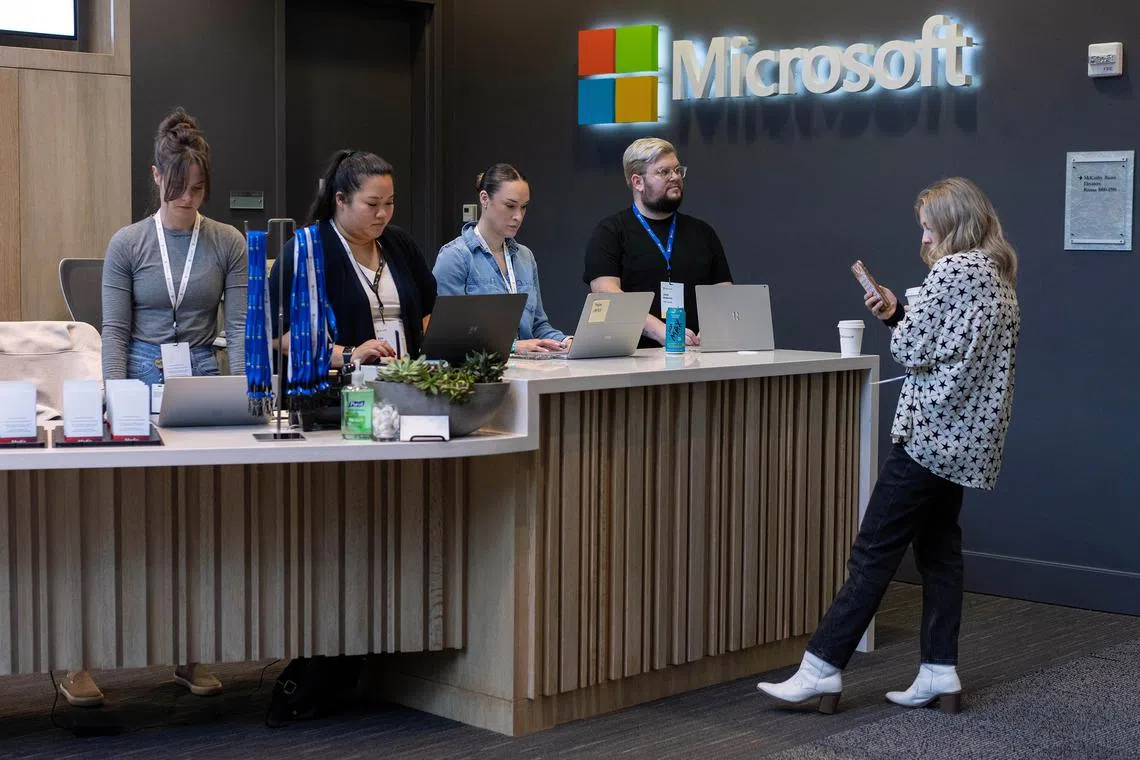Why are tech giants still cutting jobs?
Sign up now: Get ST's newsletters delivered to your inbox

Instead of hiring thousands of people every quarter, Meta, Amazon, Microsoft, Google and Apple are spending billions to build AI technology.
PHOTO: NYTIMES
SAN FRANCISCO - After a year of big layoffs, job cuts at the tech industry’s largest companies trickled into the first month of 2024.
Google started the year with layoffs of several hundred employees and a promise of more cuts to come. Amazon followed by trimming hundreds of jobs in its Prime Video department. Meta quietly thinned out middle management. Microsoft cut 1,900 jobs in its video game division.
The layoffs continued even as sales and profits jumped and share prices spiked. That disconnect, tech insiders and analysts say, is reflective of an industry facing two big challenges: coming to terms with frenetic workforce expansion during the Covid-19 pandemic while also making an aggressive move into building artificial intelligence (AI).
Now, instead of hiring thousands of people every quarter, the companies are spending billions to build AI technology that they believe could one day be worth trillions.
Mr Mark Zuckerberg, chief executive of Meta, said in a call with analysts last week that his company had to lay off staff and control costs “so we can invest in these long-term, ambitious visions around AI”. He said he had come to realise that “we operate better as a leaner company”.
From the end of 2019 to 2023, tech companies scrambled to keep up with an explosion of consumer demand, as people stuck at home splurged on new computers and spent much more time online. Apple, Amazon, Meta, Microsoft and Alphabet, Google’s parent company, added a total of more than 900,000 jobs.
When that boom ended, they were forced to adjust. Meta, Amazon, Microsoft, Google and Apple cut about 112,000 jobs from their respective peaks in 2021 and 2022. But they were still much bigger and more profitable than before the pandemic began.
Today, the five companies employ 2.16 million people, 71 per cent more than before the pandemic. Combined, they generated US$1.63 trillion (S$2.2 trillion) in sales in their most recent fiscal years, about 81 per cent more revenue than five years earlier.
Wall Street has rewarded them. Over the past year, Meta, Amazon, Microsoft, Google and Apple have gained nearly US$3.5 trillion in market value.
Employment in the broader tech industry, despite notable cuts at a number of other companies, is still positioned for a rebound. In January, tech delivered its second month of job growth, adding 18,000 workers, according to CompTIA, a technology education and research organisation. Its unemployment rate of 3.3 per cent is below the US national average of 3.7 per cent.
CompTIA chief research officer Tim Herbert said: “We go through these cycles where you see this intense focus on innovation and then the pendulum swings and there’s an intense focus on the bottom line. But when I read that Amazon is cutting back on Alexa workers or Google is cutting staff on its Pixel phone, it tells me there is a focus on margins. They’re trimming where they can and redeploying resources.”
Generative AI has altered everyone’s business priorities. The technology, which can answer questions, create images and write code, became an overnight sensation after OpenAI’s chatbot, ChatGPT, exploded in popularity.
Tech’s biggest companies are rushing to hire engineers to build AI systems. In 2023, there were 180,000 job postings in the United States related to AI, including roles in software development, semiconductor engineering and cloud computing, according to CompTIA. The number of AI job openings has expanded in 2024.
Those employees are helping Microsoft, Google, Amazon and Meta improve chatbots and build other AI systems. Apple is hiring AI engineers, as the company develops its own AI offering for release later in 2024.
The companies are also spending billions of dollars on the expensive chips and supercomputers necessary to train and build AI systems. By end-2024, Meta expects to have purchased 350,000 of specialised chips from chipmaker Nvidia, which cost an estimated US$30,000 each. NYTIMES


